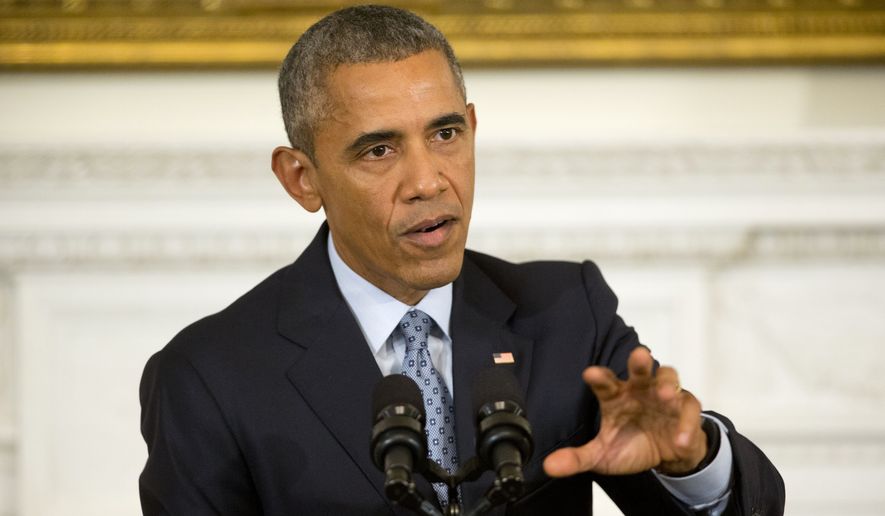A dozen Pacific-rim nations including the U.S. and Japan agreed early Monday to a massive free-trade pact that would cut trade barriers and set new labor and environmental standards, setting up a potentially contentious ratification vote before a skeptical Congress.
After a week of final talks in Atlanta, negotiators said they had reached an agreement on completion of the Trans-Pacific Partnership, one of President Obama’s main goals for his second term. The pact will cover commerce in nations representing 40 per cent of global economic output.
The agreement faces renewed scrutiny in Congress, as negotiators compromised on contentious provisions including tobacco companies and patents on U.S. pharmaceuticals.
Mr. Obama said lawmakers and the public will have months to “read every word” of the agreement before he signs it.
“If we can get this agreement to my desk, then we can help our businesses sell more Made in America goods and services around the world, and we can help more American workers compete and win,” the president said.
Senate Majority Leader Mitch McConnell, Kentucky Republican who helped the White House secure passage of trade-promotion authority earlier this year, voiced new reservations about the deal after negotiators made it harder for tobacco companies to challenge anti-tobacco regulations in various nations.
“Serious concerns have been raised on a number of key issues,” Mr. McConnell said. “This deal demands intense scrutiny by Congress, and the legislation we passed earlier this year provides us the opportunity to give this agreement that scrutiny.”
House Ways and Means Committee Chairman Paul Ryan, Wisconsin Republican, reacted cautiously to news of the deal, saying that only “a good agreement” will be able to pass the House.
“I am reserving judgment until I am able to review the final text and consult with my colleagues and my constituents,” Mr. Ryan said in a statement. “In particular, I want to explore concerns surrounding the most recent aspects of the agreement. The administration must clearly explain the benefits of this agreement and what it will mean for American families.”
Rep. Louise Slaughter, New York Democrat and one of the most vocal opponents of the deal, said negotiators “will no longer be able to keep the TPP hidden from public view.”
“As Americans learn more in the coming weeks and months about how the agreement will impact their day-to-day lives — with things like unsafe food imports and restricted access to affordable medicines — I am confident that we will be able to build opposition to defeat this bad trade deal,” she said, adding that she’s been working with members of the Australian and Canadian parliaments who are concerned about provisions in the deal to allow companies to challenge domestic laws before “a panel of three unaccountable lawyers.”
The TPP also has become an issue in the 2016 presidential race, with Democratic front-runner Hillary Rodham Clinton taking heat for trying to distance herself from a deal that she advocated as secretary of state. Sen. Bernie Sanders, Vermont independent who is challenging Mrs. Clinton for the Democratic nomination, said Monday the deal “will hurt consumers and cost American jobs.”
“Wall Street and other big corporations have won again,” Mr. Sanders said. “It is time for the rest of us to stop letting multinational corporations rig the system to pad their profits at our expense. In the Senate, I will do all that I can to defeat this agreement.”
Republican front-runner Donald Trump has called TPP “a disaster,” and many other GOP candidates have expressed opposition in varying degrees.
Mr. Obama has fought for the pact over the objection of Democrats and their labor allies, who say the deal will lead to the loss of more union jobs in the U.S. The president views the TPP as the centerpiece of his foreign-policy “pivot” to Asia and as a counterweight to China, which was not included in the agreement.
If implemented, it would be the largest trade deal the U.S. has negotiated since the North American Free Trade Agreement in the 1990s.
Progressive groups signaled that they will push Congress to reject the agreement. Sierra Club Executive Director Michael Brune said the agreement “threatens our families, our communities and our environment.”
“The Trans-Pacific Partnership would empower big polluters to challenge climate and environmental safeguards in private trade courts and would expand trade in dangerous fossil fuels that would increase fracking and imperil our climate,” he said. “Congress must stand up for American jobs, clean air and water, and a healthy climate and environment by rejecting the Trans-Pacific Partnership.”
Business groups hailed the announcement of a final deal. The National Retail Federation said TPP will benefit merchants and consumers.
“International trade supports millions of jobs in the retail industry, and that number will only grow with passage of TPP,” said NRF Senior Vice President for Government Relations David French.
• Dave Boyer can be reached at dboyer@washingtontimes.com.




Please read our comment policy before commenting.